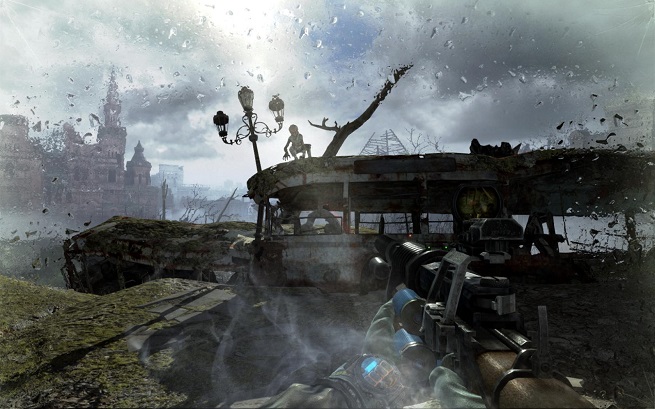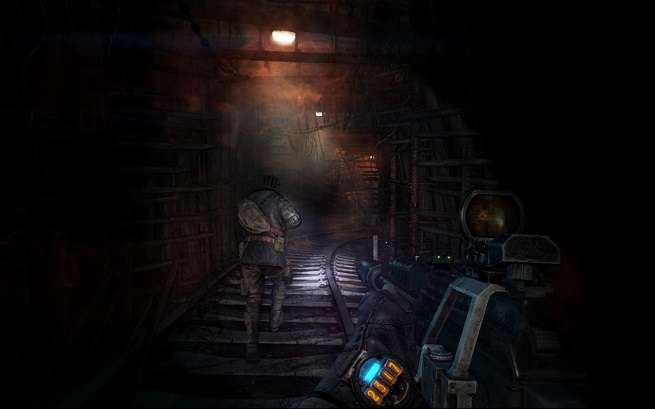
Above: The young Dark One crouches atop a rusted-out bus.
The young Dark One: Artyom’s salvation or damnation?
Stefanie: Speaking of the Dark One, what did you guys think about him as a character and plot device? For the first half, he was nothing more than a MacGuffin, a reason for Artyom to slog through the irradiated wasteland. But after you rescue him, he actually becomes a valued companion. He becomes your guide of sorts, showing you which direction to go in and highlighting enemies to make them easier to spot. He even occasionally hands you ammo or medkits.
He reminds me of Elizabeth in BioShock Infinite, an A.I. companion who’s unobtrusive and helpful. He never gets in your way and never needs protecting.
Rob: The young Dark One is the key that holds the entire narrative together, so he’s definitely not a MacGuffin. He is Artyom’s other half.
When Artyom finally rescues the young Dark One, the first thing it says is how it feels orphaned because Artyom nuked the Dark One hive. Artyom’s actions in 2033 have made him a broken man — he doesn’t know who to trust or what to believe at the beginning. Thus, earning the forgiveness from the young Dark One not only serves the plot (where the young Dark One brings its awakened kin to D6 to stop the Reds) but also brings peace to Artyom’s troubled heart. The young Dark One is key to making Artyom whole again.

Above: The young Dark One appears and stops Artyom from detonating the D6 facility.
And if Artyom can’t understand what the young Dark One can teach him, then he’s doomed do die.
Giancarlo: It’s interesting you bring up BioShock Infinite’s Elizabeth, Stefanie. I haven’t thought of the young Dark One in that way until now. It is definitely meant to be a parallel to what happened to Artyom when he was younger, and I think the creature references this a few times. Something like, “You’re like me” when talking about how alone they both were without their families.
Since I got the “bad” ending, it just seemed like the vicious circle was continuing: The nukes taking away Artyom’s surviving family, Artyom taking away the young Dark One’s family, Artyom dies trying to save the Metro — I suppose that in itself is a form of redemption — but the young Dark One lives along with the others he awakened.
If anything, the young Dark One is definitely an important part of Artyom’s legacy.
Pavel: The man who stuck a knife in Artyom’s back
Stefanie: Pavel is another great character; despite nearly being hung by the Nazis, he seems to be a cheerful guy. And Last Light is a game that can use all the cheer it can get. He compares the two of you to the Three Musketeers and dubs you “d’Artagnan.” Even though you’re a member of an opposing faction, he promises to get you safely through his side’s territory.
Pavel is a likable fellow, which makes his betrayal over drinks at a bar crushing. I yelled obscenities at the screen when it happened; although a less trusting soul would probably have seen it coming a mile away. And the worst part is that Pavel doesn’t seem to like it any more than you do. He’s just doing his job. Toward the end, when you finally confront him in a shootout in an abandoned Moscow building, the young Dark One tells you, “He isn’t red. No … anger. Just … sadness?”

Above: Artyom and Pavel walk through the Metro tunnels together.
Giancarlo: While I wouldn’t say I was as wrapped up in the character relationships as I was in something like Telltale’s The Walking Dead, Pavel’s betrayal also struck me pretty hard. I totally bought into that Musketeer speech he kept bringing up, and — though I suspected he might turn on me — I thought that’d change after I saved him from the Nazis.
But after he hands Artyom over to his superiors, I had nothing but rage. All that time chasing him down, I just kept thinking, “Fuck you, Pavel!” Even the shootout in that courtyard made me mad because that could’ve been his chance to reconcile, but he sends his dogs after me, anyway.
I agree that Pavel isn’t inherently evil and was just doing his job. He was just looking out for his own neck, which I suppose is the best anybody can do when the world has gone to shit and you have to live underground. I was just mad he still tossed Artyom’s friendship aside after what they had gone through together.
Rob: Pavel is there to show you that humanity, even on the brink of extinction, still cannot let go of divisive ideologies. This is, of course, a continuation of the same themes from 2033, so I wasn’t too surprised by Pavel’s betrayal. I was more surprised at his lack of empathy.
Pavel’s a jokey, fun-loving guy — or so it seems on the surface. But later on when Lenitsky has Anna held in captivity, Pavel is there. And he doesn’t question Lenitsky treating her like an object, as something that they can use to negotiate with the Order. He just stands there and accepts whatever Lenitsky has planned for Anna.
So Pavel clings to ideology to make sense of the world around him. He’s having an internal struggle, sure, but we’re only privy to that information right at the end when, as Stefanie mentioned, the young Dark One only sees sadness and not anger in him.
VentureBeat's mission is to be a digital town square for technical decision-makers to gain knowledge about transformative enterprise technology and transact. Learn More
